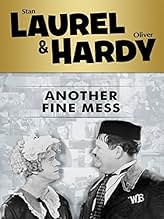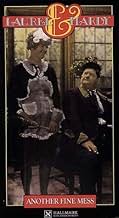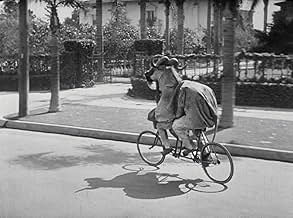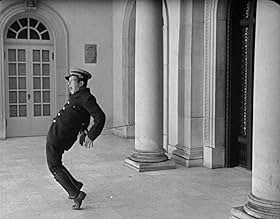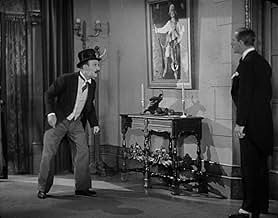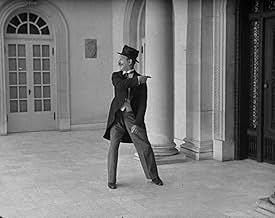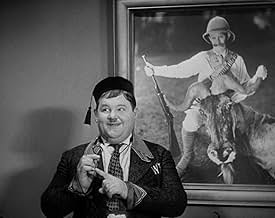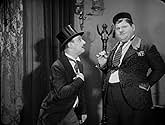ÉVALUATION IMDb
7,3/10
2,7 k
MA NOTE
Ajouter une intrigue dans votre langueTwo homeless vagabonds hide out in a vacant mansion and pose as the residents when prospective lessees arrive and try to rent it.Two homeless vagabonds hide out in a vacant mansion and pose as the residents when prospective lessees arrive and try to rent it.Two homeless vagabonds hide out in a vacant mansion and pose as the residents when prospective lessees arrive and try to rent it.
Harry Bernard
- Policeman
- (uncredited)
Bobby Burns
- Bicyclist
- (uncredited)
Betty Mae Crane
- Talking Titles
- (uncredited)
Beverly Crane
- Talking Titles
- (uncredited)
Eddie Dunn
- Meadows
- (uncredited)
James Finlayson
- Col. Wilburforce Buckshot
- (uncredited)
Charles K. Gerrard
- Lord Leopold Ambrose Plumtree
- (uncredited)
Bill Knight
- Policeman
- (uncredited)
Bob Minford
- Policeman
- (uncredited)
Gertrude Sutton
- Agnes - Maid
- (uncredited)
Thelma Todd
- Lady Plumtree
- (uncredited)
Histoire
Le saviez-vous
- AnecdotesThe main credits are spoken by twin sisters Betty Mae Crane and Beverly Crane wearing theater usher uniforms. As an alternative to standard titles, in a short-lived experiment, they performed the "talking titles" for several Hal Roach productions in 1930 and 1931. This is the only Laurel & Hardy film with spoken credits. The girls were paid $15 ($279 in 2024) each for their efforts.
- GaffesLady Plumtree refers to her husband variously as "Leopold," "Ambrose," and "Leopold Ambrose" due to two different versions of the script.
- Générique farfeluThe opening credits are spoken by two pretty girls in theater usher uniforms.
- Autres versionsThe original UK VHS edition of this film (released on the Virgin/VVL label in 1991) omits 16 seconds in the scene where Hardy is looking for his billiard room. He opens the door and escorts Plumtree into a room and says "Now what did I do with that billiard room?" The scene runs from 18:32-18:48 on the UK DVD. The scene is restored in its entirety in the DVD edition.
- ConnexionsFeatured in Hollywood: The Gift of Laughter (1982)
Commentaire en vedette
From the moment this movie begins we know we're in for something a tad unusual. In the early talkie days the folks at the Hal Roach Studio experimented with a new format for delivering opening credits: instead of simply filming title cards in traditional fashion, they built a spiffy Art Deco stage set, complete with proscenium arch, and hired a pair of young girls called the Crane Twins to march out onto the stage to deliver the film's credits verbally. The girls, who are dressed as bellboys, speak in unison at first, then alternate, then bow in tandem as they conclude. The effect is quite odd and (inadvertently?) funny, and kicks off Another Fine Mess on a curious note. The twins introduced several concurrently produced comedies featuring Charley Chase, Our Gang and the 'Boy Friends,' but this marks their only appearance in a Laurel & Hardy movie. I find the girls rather endearing myself, but in any case Roach's experiment with spoken credits didn't last long.
Enter Laurel & Hardy chased by a cop, and we're back on familiar terrain. And yet things aren't quite so familiar after all, for it soon becomes apparent that this film has a different feel from the average L&H comedy. There's an actual plot, comparatively little slapstick, and an unusual amount of verbal humor. It's no surprise to learn that Another Fine Mess was based on a stage sketch, because once the boys seek refuge in the house where most of the action takes place, it does indeed feel like a stage act is underway, as they engage in an extended routine involving disguise and mistaken identity, with some farcical elements included for good measure. Ordinarily Laurel & Hardy didn't place much emphasis on dialog humor as such, but here they do, and happily the material is pretty funny. (Interestingly, the sketch that served as this film's source material was written by Stan Laurel's father, who was a theatrical manager and playwright, though it was said that the old gent did not approve of this adaptation.) In any other L&H short the guys would've spent five or ten minutes trying and failing to enter the house, but this time they've got a rendezvous with The Plot and not so much time for physical shtick.
As it happens, the guys have taken refuge in the home of Colonel Buckshot, who has supposedly departed for Africa. His servants, who were entrusted to rent the place out, have also left for a weekend vacation. Complications ensue with the arrival of a honeymooning couple, Lord and Lady Plumtree, who are interested in renting the place. Even bigger complications are set in motion by Ollie's decision to open the door to the couple in order to get rid of them, which forces Stan to impersonate the butler, which in turn forces Ollie to impersonate Colonel Buckshot, which in turn forces Stan to impersonate Agnes the maid. That's what I love about this movie, that decisive moment that starts the ball rolling. All the guys had to do was ignore the doorbell and wait for the couple to leave, but then they wouldn't be Laurel & Hardy, and we wouldn't have this fine mess to enjoy.
It's amusing to watch Ollie brazenly attempt to assume the role of the wealthy Colonel Buckshot, behaving the way Ollie believes such people behave, and he's well matched by Stan's quick-change impersonations of Hives the butler and Agnes the maid. I especially enjoy the scene between Agnes and Lady Plumtree. We have to assume that Thelma Todd's barely suppressed laughter throughout the scene is genuine; I mean, playing opposite Stan in drag, listening to him ramble on and giggle nervously, who wouldn't crack up? While it's true that the musical score and sound effects used in Another Fine Mess are somewhat more emphatic than the typical Roach comedy of the period, as an earlier reviewer pointed out, I feel this gives the film an agreeably wacky, "cartoon-y" feel suitable to the situation. I love the moment when the real Colonel (Jimmy Finlayson, underplaying as usual) returns home and tries to grasp what has happened. His furious response prompts the silliest wrap-up ever contrived for a L&H short. It's a laugh-out-loud ending -- it was for me, anyway -- and it ensures this movie's status as a treat for comedy connoisseurs.
Enter Laurel & Hardy chased by a cop, and we're back on familiar terrain. And yet things aren't quite so familiar after all, for it soon becomes apparent that this film has a different feel from the average L&H comedy. There's an actual plot, comparatively little slapstick, and an unusual amount of verbal humor. It's no surprise to learn that Another Fine Mess was based on a stage sketch, because once the boys seek refuge in the house where most of the action takes place, it does indeed feel like a stage act is underway, as they engage in an extended routine involving disguise and mistaken identity, with some farcical elements included for good measure. Ordinarily Laurel & Hardy didn't place much emphasis on dialog humor as such, but here they do, and happily the material is pretty funny. (Interestingly, the sketch that served as this film's source material was written by Stan Laurel's father, who was a theatrical manager and playwright, though it was said that the old gent did not approve of this adaptation.) In any other L&H short the guys would've spent five or ten minutes trying and failing to enter the house, but this time they've got a rendezvous with The Plot and not so much time for physical shtick.
As it happens, the guys have taken refuge in the home of Colonel Buckshot, who has supposedly departed for Africa. His servants, who were entrusted to rent the place out, have also left for a weekend vacation. Complications ensue with the arrival of a honeymooning couple, Lord and Lady Plumtree, who are interested in renting the place. Even bigger complications are set in motion by Ollie's decision to open the door to the couple in order to get rid of them, which forces Stan to impersonate the butler, which in turn forces Ollie to impersonate Colonel Buckshot, which in turn forces Stan to impersonate Agnes the maid. That's what I love about this movie, that decisive moment that starts the ball rolling. All the guys had to do was ignore the doorbell and wait for the couple to leave, but then they wouldn't be Laurel & Hardy, and we wouldn't have this fine mess to enjoy.
It's amusing to watch Ollie brazenly attempt to assume the role of the wealthy Colonel Buckshot, behaving the way Ollie believes such people behave, and he's well matched by Stan's quick-change impersonations of Hives the butler and Agnes the maid. I especially enjoy the scene between Agnes and Lady Plumtree. We have to assume that Thelma Todd's barely suppressed laughter throughout the scene is genuine; I mean, playing opposite Stan in drag, listening to him ramble on and giggle nervously, who wouldn't crack up? While it's true that the musical score and sound effects used in Another Fine Mess are somewhat more emphatic than the typical Roach comedy of the period, as an earlier reviewer pointed out, I feel this gives the film an agreeably wacky, "cartoon-y" feel suitable to the situation. I love the moment when the real Colonel (Jimmy Finlayson, underplaying as usual) returns home and tries to grasp what has happened. His furious response prompts the silliest wrap-up ever contrived for a L&H short. It's a laugh-out-loud ending -- it was for me, anyway -- and it ensures this movie's status as a treat for comedy connoisseurs.
- wmorrow59
- 4 juill. 2004
- Lien permanent
Meilleurs choix
Connectez-vous pour évaluer et surveiller les recommandations personnalisées
Détails
- Date de sortie
- Pays d’origine
- Site officiel
- Langue
- Aussi connu sous le nom de
- Ще одине чудове діло
- Lieux de tournage
- West Adams Boulevard, Los Angeles, Californie, États-Unis(street scenes)
- société de production
- Consultez plus de crédits d'entreprise sur IMDbPro
- Durée29 minutes
- Couleur
Contribuer à cette page
Suggérer une modification ou ajouter du contenu manquant

Lacune principale
By what name was Another Fine Mess (1930) officially released in Canada in English?
Répondre
